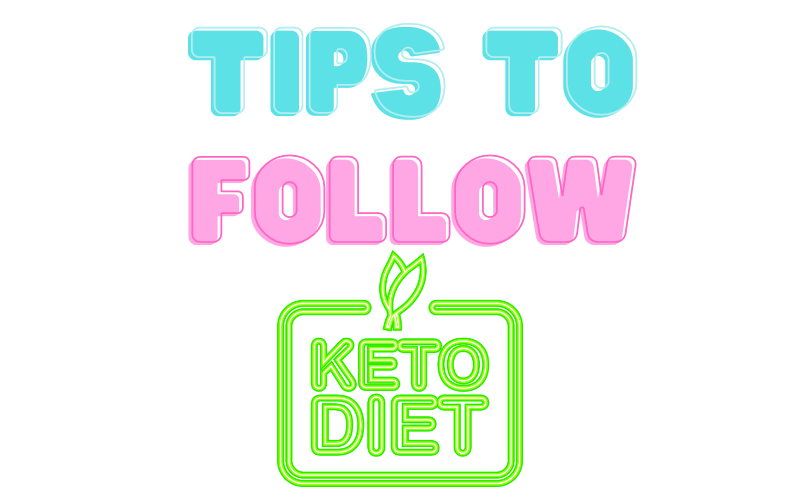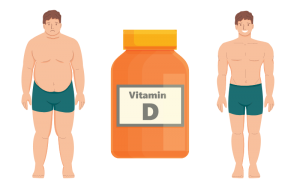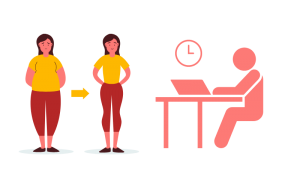The ketogenic diet is a high-fat, low-carbohydrate diet that induces ketosis in the body.
Ketosis is a state in which the body uses ketones for energy instead of glucose. The ketogenic diet has been used to treat seizure disorders, diabetes, and cancer. The ketogenic diet can also be used for weight loss.
Most people follow the Standard American Diet (SAD), which is high in carbohydrates and low in fat. Switching to the ketogenic diet may be difficult initially, but it can be done.
Tips To Follow Keto Diet

Here are some tips for following the ketogenic diet:
- Eat healthy fats: eat foods like avocado, olive oil, coconut oil, and butter.
- Eat plenty of protein: eat meat, poultry, fish, eggs, and dairy products.
- Avoid processed foods: avoid food that has been processed or has additives.
- Drink plenty of water: drink at least eight glasses of water per day.
- Supplement with electrolytes: supplement with sodium, potassium, magnesium, and calcium if needed.
- Be patient: it may take time for your body to adjust to the ketogenic diet. Stick with it, and you will see results!
Foods To Eat On Keto Diet
1. Bacon
Bacon is a portion of delicious and versatile food that can be enjoyed in many different ways. It is made from pork belly that is cured and then smoked, and it can be eaten on its own, used as a topping on other foods, or even used as an ingredient in recipes. Bacon is high in fat and protein and a portion of great food to eat on a keto diet.
2. Eggs
Eggs are a nutrient-rich food with high-quality protein, vitamins, minerals, and antioxidants. They are also very versatile and can be cooked in many different ways. Eggs are a great food to eat on a keto diet as they can help to keep you feeling full and satisfied.
3. Cheese
Cheese is another delicious and versatile food that can be enjoyed in many different ways. It is made from the milk of cows, goats, or sheep and comes in various flavors and textures. Cheese is high in fat and protein, and it makes a great addition to any keto diet meal plan.
4. Nuts
Nuts are a nutritious snack high in healthy fats, fiber, and protein. They are also a good source of vitamins, minerals, and antioxidants. Nuts make a great snack on a keto diet, as they help keep you feeling full and satisfied between meals.
5. Seeds
Seeds are another nutritious snack option high in healthy fats, fiber, and protein. They are also a good source of vitamins, minerals, antioxidants, and phytochemicals. Seeds make a great snack on a keto diet, as they help keep you feeling full and satisfied between meals.
6. Fish
Fish is a healthy food option high in protein, omega-3 fatty acids, and nutrients such as vitamin D and selenium. It is also low in calories and saturated fat. Fish is a great food to eat on a keto diet as it can help to promote heart health and weight loss.
7 . Shellfish
Shellfish is another healthy food option high in protein, omega-3 fatty acids, selenium, zinc, iron, and magnesium. It is also low in calories and saturated fat. Shellfish is a great food to eat on a keto diet, as it can help to promote heart health and weight loss.
Benefits Of Keto Diet In Different Diseases
-
Alzheimer’s Disease
A recent study has shown that when patients with Alzheimer’s eat a ketogenic diet, cognitive function significantly improves.
The ketogenic diet is a high-fat, low-carbohydrate diet beneficial for various medical conditions. The study found that the ketogenic diet improved cognitive function in patients with Alzheimer’s disease, and the improvements were most pronounced in patients in the early stages of the disease.
The study’s authors hypothesize that the ketogenic diet may help to protect the brain from damage caused by the disease. In addition, the diet may also help to reduce inflammation, which has been linked to Alzheimer’s disease. There have been claims that the ketogenic diet may effectively treat Alzheimer’s disease.
-
Parkinson’s Disease
Parkinson’s Disease is a degenerative neurological disorder that affects approximately one million people in the United States. The cause of Parkinson’s is not yet known, but it is believed to be linked to a combination of genetic and environmental factors. There is no cure for Parkinson’s, but there are treatments that can help manage the symptoms. One promising treatment option is the ketogenic diet.
The ketogenic diet is a high-fat, low-carbohydrate diet beneficial for various neurological disorders. The ketogenic diet reduces inflammation and increases brain-derived neurotrophic factor (BDNF) levels. BDNF is a protein that promotes the growth and regeneration of nerve cells. In animal studies, the ketogenic diet has improved cognitive function and reduced symptoms’ severity in Parkinson’s disease models.
There is still much research on the efficacy of the ketogenic diet for treating Parkinson’s Disease, but the preliminary evidence is very promising. If you or someone you know has Parkinson’s Disease, consider discussing the ketogenic diet with your doctor as a potential treatment option.
-
Multiple Sclerosis
Recently, there has been increasing interest in using the ketogenic diet to treat other neurological disorders, including multiple sclerosis (MS).
While the exact cause of MS is unknown, it is thought to involve an autoimmune reaction against the myelin sheath, the protective covering around nerve cells. This can result in damage to the nerves and loss of nerve function.
The ketogenic diet works by changing the way the body metabolizes energy, resulting in a decrease in inflammation and improved nerve function. In a small study of patients with MS, those who followed a ketogenic diet for six months had fewer relapses and less disability than those who did not follow the diet.
Recently there have been multiple claims that the ketogenic diet may be an effective treatment for MS, and larger studies are needed to confirm these results.
-
Cardiovascular Disease
Cardiovascular disease is a leading cause of death worldwide. A growing body of evidence suggests that the ketogenic diet may be a safe and effective treatment for cardiovascular disease. The ketogenic diet is a high-fat, low-carbohydrate diet that forces the body to burn fat for fuel rather than carbohydrates. This shift in metabolism has several potential benefits for those with cardiovascular disease.
First, it can help reduce inflammation, a major contributing factor to heart disease. Second, it can help to lower blood pressure and improve cholesterol levels. Finally, the ketogenic diet may help to protect against heart attacks and strokes by reducing the risk of arrhythmias and improving blood flow to the heart.
While more research is needed to confirm these potential benefits, the ketogenic diet shows promise as a safe and effective treatment for cardiovascular disease.
-
Type 2 Diabetes
The ketogenic diet could effectively treat type 2 diabetes. The diet works by forcing the body to burn fat for fuel rather than glucose. This process, known as ketosis, helps to regulate blood sugar levels and can lead to weight loss. The ketogenic diet is not for everyone and should only be used under the supervision of a healthcare provider. However, for people with type 2 diabetes, the ketogenic diet can be a safe and effective way to manage the disease.
Conclusion
The keto diet has always been one of the common ways to lose weight. This gave nutraceutical brands a business opportunity by selling keto diet pills for quick weight loss. However, it’s important to understand that the keto diet and supplements are not a magical solution and is not for everyone.
While the keto diet may help some people lose weight, the reality is that there is no one-size-fits-all model for diets.
What works for one person may not work for another. Furthermore, the keto diet is restrictive and difficult to maintain, so it’s not sustainable for long-term weight loss.
If you’re considering the keto diet, it’s important to talk to your doctor and be realistic about your expectations.


![How To Lose A Beer Belly? [7 Effective Ways To Reduce Beer Belly]](https://ispcs.com/wp-content/uploads/2024/01/How-To-reduce-Beer-Belly-300x169.png)










